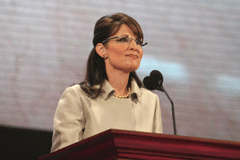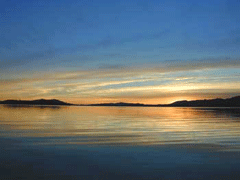The Palin Effect
Air Date: Week of October 17, 2008

(Courtesy of the Republican National Convention)
Governor Sarah Palin's number one political goal has been getting natural resources out of the earth and onto the market. Living on Earth’s Ingrid Lobet takes a look at the Alaskan governor’s environmental record and her potential energy priorities in a McCain-Palin presidency.
Transcript
CURWOOD: Vice Presidential nominee Sarah Palin boasts she took on the oil companies as Alaska’s governor – so what might she do in Washington? That’s just ahead here on Living on Earth.
[MUSIC: New York Electric Piano: “The Beauty Of Ambiguity” from King Mystery (Buffalo Puppy Record 2008)]
CURWOOD: It’s Living on Earth, I’m Steve Curwood.
Republican presidential nominee John McCain says if elected, his running mate, Alaska Governor Sarah Palin, would be his energy point person. For the past two years, Sarah Palin has governed a state with unparalleled natural resources.
Living on Earth's Ingrid Lobet looks at how the Alaska governor might influence energy and the environment in a McCain-Palin administration.
LOBET: It's a mining ticket – that's one way to view the McCain-Palin White House bid. Both candidates come from states where mining has a long history and sizeable sway. And with mineral prices high, companies are trying to win over Alaskans with promises of jobs in new mines.
PALIN: Mining is all we have. Without something happening out in our region to stimulate the economy, we're just going to wither away.
LOBET: Governor Palin's views on mining were tested this summer in a fight between that industry and another that's iconic in Alaska: fishing. A voter initiative would have sharply limited the waste allowed to flow from an immense proposed gold mine.
HALFORD: It would be an open pit mine that rivals any on earth. I believe that this issue will be the perfect storm of an environmental debate for the next ten or twenty years
LOBET: Republican Rick Halford is usually pro-mining. During decades in the Alaska state senate, he cast many votes for the industry. But he says sulfuric acid from the vast Pebble Mine could ruin the world's largest salmon fishery – Bristol Bay.
HALFORD: When you have a 500 billion dollar value in-place deposit estimate and you have 300 million dollars a year in fishery values, and you put them directly in conflict, it's going to be a perfect storm of a battle.

Bristol Bay, Alaska. Gov. Sarah Palin upset many in Alaska by opposing a proposition that would limit the amount of waste a proposed mine could dump into Bristol Bay. (Courtesy of the U.S. Geological Survey)
RASKIN: I believe she would do everything in her power to stop McCain from – if it did pass congress – signing the bill. I do believe it would be one of her strong issues to get the bill vetoed.
LOBET: Indeed Governor Palin has prioritized getting resources out of the ground, and she says she would continue that focus as vice president. She heads a multi-state agency that lobbies to advance American oil and gas interests. On the stump and in the vice presidential debate, she stresses it weakens the country to import so much petroleum.
PALIN: It's a nonsensical position we are in when we have domestic supplies of energy all over this great land, and East Coast politicians who don't allow energy-producing states like Alaska to produce these, to tap into 'em. Instead we're relying on foreign countries to produce for us.
LOBET: Governor Palin and Senator McCain agree on drilling for more oil and natural gas, both on and offshore. But they disagree on drilling in the Artic National Wildlife Refuge. Palin supports drilling in ANWR.
PALIN: What do you expect? A team of mavericks, of course we're not going to agree a hundred percent on everything. At least we can agree to disagree on that one, and I'm going to keep pushing him on ANWR, though.
LOBET: But some Alaskans, like Joe Geldhof of Repubicans for Environmental Protection say ANWR is a distraction. The real drilling activity is elsewhere.
GELDHOF: There's not much action on the Refuge. There’s a lot of rhetoric, but no real move to open it.
LOBET: The real hotspots for Alaska drilling are farther West: Prudhoe Bay and the Chukchi Sea. Palin became governor, in part, thanks to discontent over a deal to bring natural gas south via a pipeline from Prudhoe Bay. That deal, struck by ex-governor Frank Murkowski, was seen as too favorable to oil firms.
PERSILY: She pretty much said that is null and void and we're going to start over.
Larry Persily is a journalist who's also worked under three governors in Alaska, Democrat and Republican.
PERSILY: She was not going to negotiate with them, she was going to go the clear and transparent open bidding way to get a gasline and that’s what she did.
LOBET: Palin struck an agreement with pipeline company, TransCanada, to bring the natural gas to market. No pipe has been laid yet. Nor will it be anytime soon. But her actions did not endear her to BP, Conoco-Phillips and ExxonMobil up in America's largest oilfield.
PERSILY: Ohhh, they’re probably still sending her a Christmas card but it's probably signed by a machine, not by the CEO.
LOBET: Palin's other oil and gas goal, to drill in the Chukchi Sea, led her to sue the federal government when it decided to declare polar bears as threatened. She explained her opposition to the listing in a June interview with CNN's Glenn Beck.
PALIN: Our fear being that extreme environmentalists will use this tool, the ESA, to eventually just curtail or halt North Slope production of very rich sources that America needs. We need that oil, we need that gas. And I'm glad you're fired up about it, Glenn…
LOBET: Palin said her position reflected that of Alaska scientists. But documents later showed state biologists do consider the bears to be in peril.
Alaska has witnessed stronger climate changes than any other state. But Palin has not led on the issue. She's expressed doubt about human activity as a major cause of global warming. A climate cabinet she appointed reported how Alaskans can adapt to loss of sea ice and fisheries and eroding coastlines. And In joining the western states' Climate Initiative, Palin chose observer status. Again, environmental attorney Frances Raskin.
RASKIN: The key word there is "observer." I think Governor Palin probably is under a lot of pressure to do something about global warming, since it is a tremendous threat to Alaska. It’s threat to our fisheries, it’s a threat to infrastructure and to the native villages that are often right on the edge of the coast where they are suffering terrible erosion. But she has not signed on to any binding goals or come up with any ideas for reducing the addiction to oil.

(Courtesy of the Republican National Convention)
HALFORD: She's an excellent communicator and she's fairly courageous – and I think those are the ways he would use her.
LOBET: How Palin would fit in really depends on John McCain's governing style. Mark Trautwein observed John McCain up close for 20 years, beginning in 1982 when his boss, Congressman Mo Udall of Arizona, and McCain worked together on the House Interior Committee. He says the senator's approach to politics is extremely personal.
TRAUTWEIN: And this is obviously a new relationship he has with Governor Palin, so it is in the process of becoming. A vice president Palin's influence on a President McCain would depend on whether he truly likes and respects her, and that we just don't know.
LOBET: What we do know is that if the GOP ticket wins, we'll have a vice president shaped by a state where wilderness seems endless, and where more than 40 percent of revenue comes from petroleum.
For Living on Earth, I'm Ingrid Lobet.
Links
Living on Earth wants to hear from you!
Living on Earth
62 Calef Highway, Suite 212
Lee, NH 03861
Telephone: 617-287-4121
E-mail: comments@loe.org
Newsletter [Click here]
Donate to Living on Earth!
Living on Earth is an independent media program and relies entirely on contributions from listeners and institutions supporting public service. Please donate now to preserve an independent environmental voice.
NewsletterLiving on Earth offers a weekly delivery of the show's rundown to your mailbox. Sign up for our newsletter today!
 Sailors For The Sea: Be the change you want to sea.
Sailors For The Sea: Be the change you want to sea.
 The Grantham Foundation for the Protection of the Environment: Committed to protecting and improving the health of the global environment.
The Grantham Foundation for the Protection of the Environment: Committed to protecting and improving the health of the global environment.
 Contribute to Living on Earth and receive, as our gift to you, an archival print of one of Mark Seth Lender's extraordinary wildlife photographs. Follow the link to see Mark's current collection of photographs.
Contribute to Living on Earth and receive, as our gift to you, an archival print of one of Mark Seth Lender's extraordinary wildlife photographs. Follow the link to see Mark's current collection of photographs.
 Buy a signed copy of Mark Seth Lender's book Smeagull the Seagull & support Living on Earth
Buy a signed copy of Mark Seth Lender's book Smeagull the Seagull & support Living on Earth

